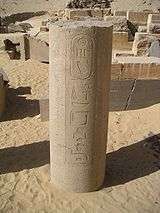Spine with fluid (hieroglyph)
| ||
| Spine issuing fluid(?) in hieroglyphs |
|---|
The Ancient Egyptian hieroglyph of a Spine issuing fluid is Gardiner sign listed no. F40 for the animal spine, fluid falling from each end. Another hieroglyph, Gardiner F39 shows only half of the spine,
-(referring to 'dignity', or 'to be revered').[1]
|
|
The Spine with Fluid hieroglyph is used in Egyptian hieroglyphs as a biliteral with the language value of Aw-(Au) and consists of the Egyptian vowel uniliterals of a, the vulture, Gardiner G1-(birds),
, and w, the quail chick, Gardiner G43,
|
|
|
|

Spine with fluid, stating: "...(pharaoh)-Lord (of) Extent of (the Land's) "Happiness"...."
(uses the Heart (hieroglyph))
(uses the Heart (hieroglyph))
The use of the spine with fluid hieroglyph is for words showing "length", as opposed to 'breadth', (Egyptian usekh-(breadth, width)-for example, the Usekh collar). Some example words for 'length' are: to be long, length, to extend, extended; and for to expand, to dilate, words like: joy, gladness, pleasure, delight.[2]
Preceded by
vulture: a - (unil.) Vulture (hieroglyph) (start of alphabet) |
spine with fluid 3w-(3u) |
Succeeded by
chisel 3b - (phonogram) |
See also
| Wikimedia Commons has media related to Spine and nerve (aw hieroglyph). |
References
- Betrò, 1995. Hieroglyphics: The Writings of Ancient Egypt, Betrò, Maria Carmela, c. 1995, 1996-(English), Abbeville Press Publishers, New York, London, Paris (hardcover, ISBN 0-7892-0232-8)
- Budge. An Egyptian Hieroglyphic Dictionary, E.A.Wallace Budge, (Dover Publications), c 1978, (c 1920), Dover edition, 1978. (In two volumes) (softcover, ISBN 0-486-23615-3)
This article is issued from Wikipedia - version of the 11/21/2016. The text is available under the Creative Commons Attribution/Share Alike but additional terms may apply for the media files.